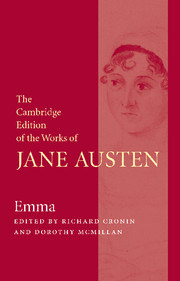Chapter 12
Published online by Cambridge University Press: 18 December 2020
Summary
ONE thing only was wanting to make the prospect of the ball completely satisfactory to Emma—its being fixed for a day within the granted term of Frank Churchill's stay in Surry; for, in spite of Mr. Weston's confidence, she could not think it so very impossible that the Churchills might not allow their nephew to remain a day beyond his fortnight. But this was not judged feasible. The preparations must take their time, nothing could be properly ready till the third week were entered on, and for a few days they must be planning, proceeding and hoping in uncertainty—at the risk—in her opinion, the great risk, of its being all in vain.
Enscombe however was gracious, gracious in fact, if not in word. His wish of staying longer evidently did not please; but it was not opposed. All was safe and prosperous; and as the removal of one solicitude generally makes way for another, Emma, being now certain of her ball, began to adopt as the next vexation Mr. Knightley's provoking indifference about it. Either because he did not dance himself, or because the plan had been formed without his being consulted, he seemed resolved that it should not interest him, determined against its exciting any present curiosity, or affording him any future amusement. To her voluntary communications Emma could get no more approving reply, than,
“Very well. If the Westons think it worth while to be at all this trouble for a few hours of noisy entertainment, I have nothing to say against it, but that they shall not choose pleasures forme.—Oh! yes, I must be there; I could not refuse; and I will keep as much awake as I can; but I would rather be at home, looking over William Larkins's week's account; much rather, I confess.—Pleasure in seeing dancing!—not I, indeed—I never look at it—I do not know who does.—Fine dancing, I believe, like virtue, must be its own reward. Those who are standing by are usually thinking of something very different.”
This Emma felt was aimed at her; and it made her quite angry. It was not in compliment to Jane Fairfax however that he was so indifferent, or so indignant; he was not guided by her feelings in reprobating the ball, for she enjoyed the thought of it to an extraordinary degree.
- Type
- Chapter
- Information
- Emma , pp. 277 - 283Publisher: Cambridge University PressPrint publication year: 2005

